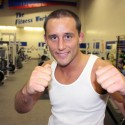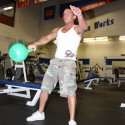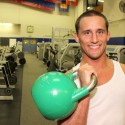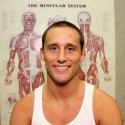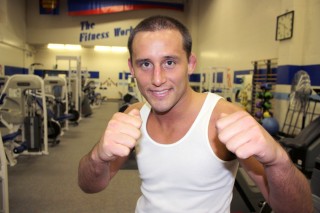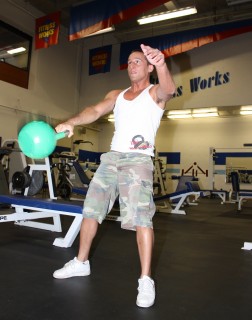This content was published: May 10, 2010. Phone numbers, email addresses, and other information may have changed.
Q & A: Sweden’s Andreas Correa is getting fit at PCC
Photos and story by James Hill
Stockholm native Andreas Correa, 30, is a PCC international student, working on an associate’s degree in the Fitness Technology program and plans to graduate this spring. After graduation he plans to continue his education at Portland State University, looking to major in physical exercise and health sciences, with the ultimate goal of graduating from Oregon Health & Science University’s School of Medicine.
Correa got into karate in 1989, which blossomed into training in various forms of martial arts. After high school, he joined the Swedish Navy and became one of the few who are selected into Ranger School at the First Marine Regiment every other year. After making it through the 15-month training, he was awarded the Green Beret and the Neptune Trident, which is the insignia of the Swedish Navy Commandos (Kustjägarna) – Sweden’s equivalent to the U.S. Navy Seal.
In 2008, he made the decision to pursue a career as a mixed martial artist in the United States so he moved to Portland to join Team Quest. After a stint with them, Correa moved on and now works out with 5 Rings Jiu Jitsu, where he has since been training and competing while attending PCC full-time. When not in school or in the gym training, Correa makes a living as a massage therapist, chiropractic assistant, physical therapist aide and personal trainer at Eastside Wellness Center.
His father is Swedish and his mother is from Argentina. He has three brothers and two sisters.
What have you learned at PCC’s Fitness Technology Program?
Correa: There are a lot of things. Fitness and health is an area that is always evolving. It’s like taking a computer class every so often to update your skills. There are always new things to learn and the teachers are really good. The big thing is that teachers in the program make you think about where you want to take this. They challenge you to think. So regardless where you want to go in the health, fitness, wellness or medical fields I believe that the Fitness Technology program is a great place to start.
What brought you to the United States?
Correa: About five years ago, Randy Couture – then Heavyweight UFC Champion – of Team Quest came to Sweden to do a seminar. I was training, doing my thing, had my job, but I always loved competing. It was a pretty big thing. I talked to him afterward and he was a really nice guy. He said. ‘You could always come train in the U.S.’ I thought, ‘I’m actually going to do that.’ Ten weeks later I went to Portland to train with those guys and did pretty well. At the time I had my own company. I had a lot of clients, lot of loose ends where I couldn’t just pick up and leave. It took me three months to get rid of everything. I gave up everything; I left my family. And sold everything I owned. It was a big thing for me to do.
Why did you get into the Swedish Navy and its rigorous Rangers training?
Correa: I’ve always been really athletic. I started training martial arts when I was 9. I’ve always wanted to compete and that’s why I train so hard. Those are things I’ve always had in me. In Sweden, I had a really nice childhood and grew up somewhat pampered. At some point, I got sick of it. One of my favorite teachers was a former Navy Commando and was a role model so I wanted to do what he did. At 18, you get a recruitment letter and its mandatory to go into the military recruiting and do a standardized military physical assessment and depending on how well you do, more or less, jobs will be available to you. For Ranger selection, apart from scoring very high on your first test you also need to pass the Ranger Assessment and Selection Course. For me it was an easy choice because I wanted to see if I could do it. People had told me that I couldn’t and wanted to prove them wrong. It’s easy to get in but hard to complete. It took me almost two years but I learned a lot about myself. Sixty-five people got in and 28 finished. You always thought, ‘today can’t be harder than yesterday.’
How is life in Sweden different than the United States?
Correa: I’d always heard that Portland is a very European city. I haven’t been all over the U.S. but when it comes to Portland, compared to all the places I’ve been to, it has been most like what I came from. Stockholm is the same size in population. For me it was a kind of a step up in terms of weather. It was easy to get used to the environment. As far as the life, Swedish people are different from American people. That took time to learn, the culture differences, specially how people interact with each other here. Swedish people are pretty boring and stick to themselves. They talk to only those they know. Here, I get eye contact and get a, ‘Hey, what’s up.’
What’s your favorite aspect of American life?
Correa: Sweden is environment-friendly. Portland is too but you have nothing on Sweden. In Sweden you can’t drive. Gas prices and taxes are really high. I like my car and that’s what I missed when I went home to visit. You have drive-throughs here and drive-through ATMs and we don’t have those. In America anything is possible and you can get anything. Regardless of what you want to do you can always find your thing.

